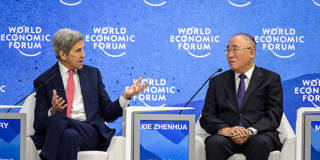JEAN PISANI-FERRY

PARIS – On the same day that the Intergovernmental Panel on Climate Change published its latest report on the urgent need for climate action, Chinese President Xi Jinping visited Russian President Vladimir Putin in Moscow. There, the two leaders issued a statement criticizing the West and emphasizing their intention to deepen the Sino-Russian strategic partnership.
It was a revealing coincidence, highlighting the extreme tension in today’s international relations. On one hand, preserving global public goods – such as the climate and biodiversity, as well as institutions and procedures to prevent future pandemics – requires urgent coordinated action. On the other hand, geopolitical fragmentation and the intensifying Sino-American rivalry are making coordination increasingly difficult.
Such tension is not entirely unprecedented. Admittedly, geopolitical rivalry between the United States and the Soviet Union did not prevent the two Cold War powers from cooperating to prevent a direct confrontation and curtail nuclear proliferation. But the hierarchy of issues was not the same back then. When the post-World War II order was conceived, the focus was not on managing the global commons, but rather on fostering economic ties through trade and investment, in the hope that this would strengthen political alliances. Preventing climate change, preserving biodiversity, and avoiding the depletion of high-sea fisheries were not on anyone’s radar.
More surprisingly, the global commons remained a low priority even into the early 1990s, after the Soviet Union’s collapse created an opportunity to rebuild the world system. Although the 1992 Earth Summit in Rio de Janeiro raised awareness about planetary limits, most of the focus in these years was on integrating the newcomers – China, Russia, and Central and Eastern Europe – into the pre-existing web of trade and investment agreements. There were talks about creating a global environmental institution, but these did not go far.
The obstacle was not so much the Cold War’s legacy, but rather the global north-south divide. In 1997, the Kyoto Protocol on climate change treated Russia, Poland, Hungary, and other ex-communist countries as being on par with advanced economies, but it exempted emerging economies like China and India from meeting similar emissions-reduction targets on development grounds.
While balancing cooperation with geopolitical rivalries is not an entirely new challenge, most of the lessons from the past are ambiguous. While the US and the Soviet Union did avoid a nuclear confrontation, they failed to create a World Health Organization that would be strong enough to overcome geopolitical tensions and protect us from emerging pandemic diseases. On the contrary, the WHO became a field for ideological confrontation.
Unless the US and China can cooperate effectively, despite their deepening rivalry, there will not be much hope of tackling global challenges. The two countries did cooperate in the past. The joint declaration issued by US President Barack Obama and Xi in November 2014 was instrumental in paving the way for the Paris climate agreement the following year. And more recently, John Kerry, President Joe Biden’s climate envoy, has continued to communicate with his Chinese counterpart.
Moreover, Biden’s national security adviser, Jake Sullivan, has stressed that rivalry does not exclude cooperation. As he made clear upon the release of the latest US National Security Strategy, “we’ve come to a point where we can and simply have to tackle both geopolitical competition and shared transnational challenges on an equal plane. So, we are building a strategy fit for purpose for both competition we cannot ignore and global cooperation without which we cannot succeed.” The implication is that cooperation does not require geopolitical alignment or belief in the virtues of democracy.
These are excellent principles. But will deeds match words? Recent events highlight the difficulty of threading this needle. Consider the dispute over the origins of COVID-19, which remains a bone of contention between China and the West. The US and its allies suspect that China is concealing evidence, whereas China regards the demand for an independent international enquiry as an encroachment on its sovereignty. Vaccines also remain a stumbling block, with China paying a high price for having refused (on sovereignty grounds) to purchase vaccines from Pfizer/BioNTech or Moderna. China has also been muddying the waters by insisting that the US give way on unrelated matters in exchange for cooperation on climate-mitigation efforts.
Good intentions will never last long in an environment of mistrust. Unfortunately, no word better describes the current state of the US-China relationship. Last month, the appearance of a Chinese balloon over the US led Secretary of State Antony Blinken to cancel a planned visit to Beijing, and Democrats and Republicans in Washington are now trying to outcompete each other for hawkishness. As the recent congressional grilling of TikTok’s CEO showed, neither party wants to be seen as going easy on America’s top rival.
The state of the global commons is too serious a matter to be held hostage to permanent political feuding. China and the US must find ways to separate cooperation from rivalry. Former Israeli Prime Minister Yitzhak Rabin famously claimed that he would fight terror like there were no peace talks and make peace like there was no terror. To save the planet, today’s leaders must take his words to heart and make a similar commitment.
No comments:
Post a Comment